
Atlas F1 GP Editor
Christian Horner knows exactly what it takes to start a new Formula One team. He's been thinking it over, dreaming about it, almost tasting it - and if the Powers that Be in F1 would just take the necessary measures, he's ready to go within 12 months. The owner of the most successful team in F3000 today is looking to make the next step up the ladder, and he told Atlas F1's David Cameron exactly what the FIA and the F1 teams should talk about in their critical meeting next week
Christian Horner is used to winning, and as team principal of Arden International, he's had plenty of opportunity to do so. The team, which was formed in 1997 to allow Horner to further his driving career before moving solely into a managerial role, won the European Formula 3000 Team Championship in 2000 ahead of a move into the FIA competition, which the team won in 2002 and 2003 while providing the environment for Tomas Enge to win the Drivers' Championship (later revoked after recording a positive drug test) ahead of Bjorn Wirdheim's title last year.
Starting as they mean to go on, Arden had a 1-3 result in the first race of the 2004 F3000 season at Imola in the hands of Vitantonio Liuzzi - the Italian's debut win in Formula 3000 - and Robert Doornbos respectively. Arden are currently at the pinnacle of the junior category, and that looks to be continuing in the foreseeable future.
Success breeds success, but whereas in the past a team which ran well in the junior categories would be able to progress up the ladder much as their drivers did, in the last few years there have been a number of obstacles put in the way of any would-be modern Bernie Ecclestone or Max Mosley, both of whom moved into team management after a relatively unsuccessful driving career by buying some cars and forming a team to go racing.
Horner has proven that he has what it takes to run a successful motor racing team, and he has been quietly positioning his team with an eye towards the big game. Ahead of the Formula One team principal's meeting in Monaco next week, at which Mosley has stated initial discussions will be raised regarding moves to bring more teams into the Championship, Horner has laid out his ideas on how he feels such a move could, and should, be made for the benefit of Formula One.
Christian Horner: "Arden is a team that's young, ambitious, and has been reasonably successful over the last couple of years, in effect winning the First Division. At the moment there's no way we can move into the Premiership due to the entry criteria that exists; really only a major motor manufacturer could afford to commit the bond required [of $48 million] and the huge design, development, production and running costs that are associated with Formula One at the moment.
"However, if that criteria were to change and there was an opportunity to run a customer car - a year old car - and the entry bond were to disappear, then for us as a team we would, I believe, be in a reasonable position to look at moving forward, with a budget that was sensible and a known factor. Because if you bought, for example, a Renault or BAR or Williams, if they were prepared to sell them and as that car finished the Japanese Grand Prix, and then you ran that with a limited development programme as a race team, and with a sensibly priced engine - which would obviously have to be what the package was previously - then you could do a pretty respectable job, and far more cost effectively.
"If you look recently at the teams that have come in to Formula One and failed, they've all over-exceeded themselves on the design and build side of the car - Pacific, Simtek, Forti - in an effort to be competitive they've over-exceeded themselves to try and build a competitive car, which ultimately hasn't been, and then they've had no money left to run it. If you were able to run as a race team, it would not necessitate the four to five hundred people involved to manufacture a car, and I believe you could do a pretty reasonable job.
"Even if it were a stay of execution prior to having to build your own car - and I understand that was one idea that was kicked around, whereby they give you a three year period to establish yourself. But if you look at that, for me it would be the perfect way to enter because you start with a blank sheet of paper. Presently the only way to go in is to buy your way in, and this with perhaps packages that aren't ideal, whether it be financial or whatever. So to start with a clean sheet of paper, to do it on your terms, for Arden would be a major move forward from where we are now, but one that I believe we would be up for the challenge."
DC: let's break it down a bit. The first thing is the buying of the chassis; you have to find a team that is prepared to do that. Do you think in this day and age that is viable?
Horner: "It depends; if they change the Constructors' Championship to where there is more than one team that can win points for a Manufacturer, then why couldn't Renault or BMW or even Mercedes have a junior team with junior drivers? Renault are one of the manufacturers who are very proactive about working with young drivers, and they have several talented youngsters on their programme, whether it be (Franck) Montagny, (Heikki) Kovalainen or (Jose Maria) Lopez, and BMW are beginning to look similarly through their categories.
"So firstly it would have to be a chassis/engine package; there's no point taking a Williams chassis and trying to mold a Cosworth engine into the back of it. And ideally you'd work as a customer and have a strong relationship that included engineering support and whatever. If you look at the way that the World Rally Championship works and the customer teams that are running with cars that are a year old or with specifications behind, that works and it's working well.
DC: you make a good point about the engine and chassis being made to work with each other, although of course there was the famous ten million euro engine deal last year which never happened. Surely it would be even more difficult to get an engine/chassis deal?
Horner: "Yes, and we are a long, long way away from it, and there is a colossal amount of discussion that needs to take place with the FIA, the current teams and the manufacturers. But if something could be structured in that way, with engines at around the figure that was mentioned last year, then chassis are a moving target.
"I mean, what is a second hand Formula One car worth? I guess it's worth whatever someone is prepared to pay for it at the end of the day, with what they perceive is the design time that's gone into it. That's a big unknown at the moment when you try to piece together costings, but if there was incentive for the current teams to do it, either with the drivers programme or engineers or even just more information during the weekend and with Manufacturer's points at stake.
"I believe that Formula One needs new blood; all the guys that are in there at the moment are getting older, and at the moment there's no way that a young, ambitious team can move forward, and something has to change for that to happen. At the moment there's only one manufacturer who can afford to come in, and other than that there's no one hammering on the door that can afford to be there."
DC: There have been junior teams for Formula One in Formula 3000 before, for example Jordan and Super Nova, but this is really taking it a step up.
Horner: "It's a quantum leap from there, but in Formula 3000 we have ninety percent of our personnel who have worked in Formula One, or gone on to work in Formula One. It's a people sport, and if you get the right people, the right mechanics, the right technicians, the right engineers and the right engineering support then I don't see why you couldn't do a pretty respectable job.
"Okay, you're not going to be moving forward with development like the big teams are, but if you take a well sorted package and you run that, and you fine tune it with a limited amount of development over the year, I'm pretty sure you could do a respectable job. If you took last year's Renault or McLaren for example, you'd still be running ahead of Jordan and maybe even be in the realms of a Toyota or a Sauber. I think you could do a reasonable job."
DC: The entry fee into Formula One is $48 million, and the reason that came in was the folding of the smaller teams that you've mentioned, which was seen as a reasonable step at the time. What would you say to the FIA about that?
Horner: "Well if you eliminate the colossal overhead of the production and design of the car, with the windtunnel time and all the finite analysis and the investment that goes into creating the cars and just run as a racing team, then you're starting with a known factor; you haven't got this big unknown of production and design and so on, and you could then work within a budget. It would potentially be more workable than having this huge monkey on your back, and having a payroll of four hundred people at the end of every month."
Horner: "Sure, but that was at a time when they could afford to be choosy about the teams that they had, and I think the problem at the moment is that if you had one or two manufacturers withdraw from the F1 Championship then what is the void going to be filled with? The teams would either have to run third cars or allow new teams to come in, and ultimately teams don't last for ever. But from our point of view we're a young, ambitious team with nothing to lose in setting ourselves a target like that and then working to achieve it. The interest that's been generated from it already is amazing because you're not selling a Formula 3000 championship; you're selling an international sport that is reaching a colossal international audience."
DC: The other side of this is that $48 million sounds like a colossal amount of money, but if you have the right money manager they could find you the money at reasonable rates, and the repayments plus interest could ultimately just go back to them, with overheads.
Horner: "Yes, but I don't think there is any team or company that could pay that bond, and that would have to be addressed. There needs to be a criteria for coming in - and maybe demonstrating your ability and so on in an FIA championship should be a criteria so that it's not just someone who appears from nowhere and says 'right, we're going to be a Formula One team'. So there has to be substance behind it. And maybe a promotion and relegation system or something along those lines could be considered. Something has to change."
DC: Looking at the budget, the amount you need to go racing in Formula 3000 is very small in comparison to a Formula One team; there is a lot of money that would need to be raised to step up.
Horner: "It's all relative at the end of the day; to find 2.5 million euros to run a competitive Formula 3000 team is probably as hard as finding 35 million euros or whatever it would take to run a customer Formula One team. But what you are selling in Formula 3000 is limited; there's limited TV, there's limited exposure; it's an industry provider rather than offering a commercial return, whereas with Formula One you have got a global audience that's marketable, basically. If you look at the budgets of the current teams they're just colossal, and you can't achieve those without manufacturer support, but I think a realistic budget would be achievable."
DC: What do you think a realistic budget would be?
Horner: "It's so difficult to quantify that at the moment, because it depends on so many factors that would be involved; what the deal is on the car and the engines would obviously be a huge part of the budget; what benefits - if any - you would be entitled to on travel and television revenue. So it's a very difficult question to answer until you have all of the facts in front of you."
DC: And you can't have the facts in front of you…
Horner: "…until they've gone to the next stage of their discussions. I'm just pleased that they're talking about it, and all we can do is keep winning, keep our profile high, and keep looking for opportunities to move forward.
DC: As it stands, only the top ten teams get revenues from television and travel money at the end of year; there's ten teams now, so one more team coming in means one team misses out. I guess the answer to that is it relies on the existing teams to say they are prepared to give up a bit of money to extend the funds to all teams.
DC: Have you spoken to Max Mosley at all about this issue?
Horner: "We've had a couple of discussions over the last twelve months where I've asked the question how do we progress, as we've won this championship in 2002 and 2003 and we want to go forward, and he's always been very supportive. So yes, it's a subject that we've discussed on a couple of occasions."
DC: Do you see anything moving forward in the foreseeable future that would allow you to run along these lines?
Horner: "I think they've got so much ground to cover that I don't think there'll be any swift answers, but as I said before, the positive thing is they're talking about it, they're looking at ways for new teams to enter Formula One. Now obviously that has its downside for the existing teams, because if you put more than ten in there it possibly devalues the effective franchise that there is at the moment. So it has to work for everybody, and we'll just have to watch and see what develops."
DC: I can see that anything over twelve teams may devalue the existing teams, but anything between ten and twelve doesn't really; the Concorde Agreement was set up around twelve teams, and if you're the eleventh then it doesn't really take away very much.
Horner: "No, but at the moment to enter Formula One you really have to buy a current team. By adding another team you add another potential team that could be for sale, and I imagine the last thing they want to do is flood the market with teams. But as I say it's great that they are discussing it, and hopefully it will move forward a little, albeit I doubt very quickly."
DC: How long do you think it would take if, for the sake of argument, Max Mosley says, 'I've read this article and agree with your thoughts' and the teams then somehow all fall in line and agree to all of the changes - then how long would it take to set up a team in Formula One?
Horner: "Twelve months."
DC: To do all of the deals that would be necessary to get there?
Horner: "I believe you could do it in twelve months."
DC: What would be the process you would go through if you were told you could go for it?
Horner: "Obviously the first stumbling block is the financial investment, in order to get the thing up and running. [Russian oil company] Lukoil, for example, is a previous partner of ours and would have been the perfect type of company to get involved in this kind of project. So you've got to identify and bring in the right kind of financial partners and the right structure, and then you've obviously got to piece together the terms of the deal of what chassis and engine package and what association with a manufacturer or team you're going to have. I mean obviously you wouldn't be too keen to buy a second hand Minardi at the moment."
DC: All things being equal, you have a customer car and engine, you don't have to have a design department for three years, you don't have a lot of the requirements many of the existing teams have; what would you say is the ideal size of team you would need to run?
Horner: "I think you need a race team and a marketing team basically to support the commercial side, and you could do it with between 55 and 60 people. McLaren probably bring that many people to an event. But if you look at it and you're running cars, you're not designing them and so on, and then you could do it with 55 to 60 people."
DC: This is on track and in the factory?
DC: And just slowly build it up over the next three years?
Horner: "Obviously you'd have to, if the criteria were in three years you have to design a car, you've got three years to build a design team and so on. But yes, at an initial entry stage you could be operational at that number of personnel, and obviously at the moment in the part of the world where we're based (Banbury, Oxfordshire, in the middle of the so-called British Motorsport Valley) the industry is in recession and there are a number of very good people on the market.
"And in taking a good young team that had the balance of experience and youth in there, and two good drivers, I think you could do a reasonably good job. You already know the package you're starting with, and you'd be just fine tuning and as I say evolving that package rather than bringing in aerodynamic updates at every event and all the other vast costs and spending that the other teams currently endure."
DC: the other side of this is that you won't be bringing aerodynamic advances to each race, but the other teams will, so you'll be standing still.
Horner: "You need varied packages, for low downforce, high downforce and so on, and within your budget you would need some development costs. Obviously teams don't build cars with umpteen spares and so on, so there is still the servicing of those cars, because the last time I heard there was something like six hundred life components on those cars, so you've still got to have your relationship with your suppliers to the team or the manufacturer you're going to work with, in order to manufacture parts and components.
"But if you take Renault as an example, their car this year is obviously a step forward from last year, and they know last year's car inside out. If they had two good drivers in that car then they are getting twice the information than from just two race cars. And also they're able to look at a Montagny or a Kovalainen or a Liuzzi for example, and under pressure; it's like Manchester United have got their A team and their reserve team, and they can cherry pick the ones that they want for their A team."
DC: common wisdom in Formula One says that if you stand still you are going backwards. If the senior teams are moving ahead race by race with aerodynamic advances, then…
Horner: "…Yes, you would start closer and then you'd be trying to refine that package, and, yes, ultimately you would diminish a little. But you would map into your programme one or two or three updates throughout the course of the year."
DC: but where are these updates going to come from?
Horner: "Well that's the thing; that's where you've got to have a relationship with a manufacturer, with a team to move it forward. Otherwise you take a package and you keep fine tuning it."
DC: but another team is not going to want to advance last year's car; they're going to want to advance their own car. Are you then going to find yourself needing somebody in design to refine the package?
Horner: "You could go to a design house; you go to a Lola or a Dallara or whomever and say 'this is the package we want, can you design it?' There are so many questions and variables that are out there, but certainly if you can start with four cars that are built and are a known quantity, then you'd be starting from a hell of a starting point compared to a blank piece of paper and having to design and build something yourself."
DC: the teams now build anywhere between seven and ten tubs a year, but you're not going to want to buy that many, surely?
Horner: "Well you'd buy whatever stock you could; if you could buy four rolling chassis and a load of spares and components then that's the type of package you'd be looking to take on."
DC: I imagine the engine side wouldn't be as much of a problem for updates, as there are already customer deals in existence and they get advancements throughout the year; it's just the chassis side.
DC: they are talking about control tyres from 2008, which takes away another variable.
Horner: "Quite possibly. As I say, I'm just delighted that they're talking and considering ways to bring new teams into the Premier League. All we can say is we're a team that wants to move forward and we're using Formula 3000 as our shop window, and we want to use it as a springboard into something else. At the moment it's impossible, but if those criteria change, then we're in a perfect position to take a look and have a go at it. We're young and ambitious, and we want to go forward.
"I don't see myself staying in Formula 3000 or its replacement, and I have no motivation to be here for the next ten years. We've won, we've consistently won, and now is the time to move forward. It's just finding the opportunity to do that."
Ten years ago, no less than 14 teams - that's 28 drivers - were entered for the 1994 San Marino Grand Prix. In the ensuing period, at least half a dozen teams have fallen by the wayside and Formula One's exclusivity is now threatening to disappear up its own fundament. It has been obvious for all to see over the last couple of years - with the demise of Prost and Arrows, as well as the constant instability of Jordan and Minardi - that something needs to be done. Urgently.
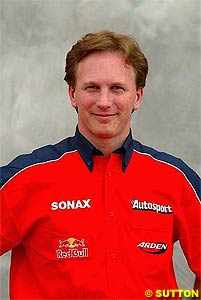 Unlike in previous years, there's no one outside looking to come into Formula One under the present conditions, but should things change, one man is ready, willing and able to take on the challenge of forming a new Formula One team.
Unlike in previous years, there's no one outside looking to come into Formula One under the present conditions, but should things change, one man is ready, willing and able to take on the challenge of forming a new Formula One team.
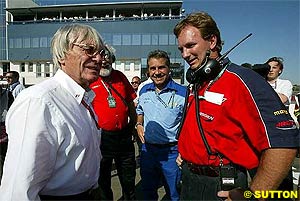 "Even in Moto GP; you've got customer teams that are running very, very competitively; I think (Max) Biaggi is on a customer bike effectively, but he's running well and challenging for race wins. It could be done, but there has to be a motivation for the current teams to do it, and the current manufacturers to support it."
"Even in Moto GP; you've got customer teams that are running very, very competitively; I think (Max) Biaggi is on a customer bike effectively, but he's running well and challenging for race wins. It could be done, but there has to be a motivation for the current teams to do it, and the current manufacturers to support it."
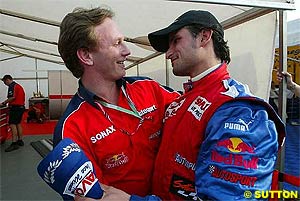 DC: Of course the deal with the $48 million is that they pay it back to your at $2 million a month, so their argument is that it's a big hit up front but ultimately it comes back to you.
DC: Of course the deal with the $48 million is that they pay it back to your at $2 million a month, so their argument is that it's a big hit up front but ultimately it comes back to you.
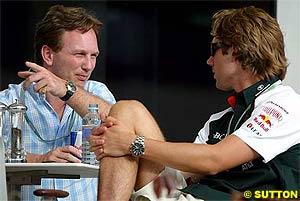 Horner: "It's very difficult for me to comment on that at the moment, because that's something the commercial rights holder and the FIA have to sort out with themselves and with the teams."
Horner: "It's very difficult for me to comment on that at the moment, because that's something the commercial rights holder and the FIA have to sort out with themselves and with the teams."
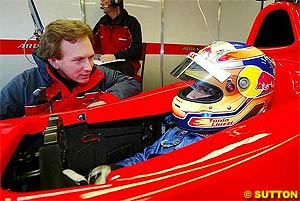 Horner: "Yes. Your race team would also be your test team, because you're doing limited testing, and from the numbers that I've looked at as a race team you could do it with that amount of personnel."
Horner: "Yes. Your race team would also be your test team, because you're doing limited testing, and from the numbers that I've looked at as a race team you could do it with that amount of personnel."
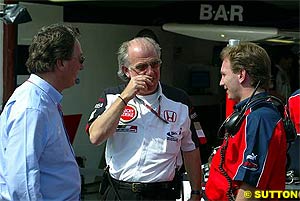 Horner: "Yes. There's a big question mark about it; we've only just started discussing the topic in this type of detail, but it would be a hell of a starting point to turn up in January with the cars that finished Suzuka in November, for example. A team probably has maybe half a second in the new chassis throughout the winter, and the rest probably comes from the tyres. They're quoting times of two second gains (this year), and I'm sure not all of it is coming from the car; I'm sure a lot of that is coming from the tyre. So if you can refine and fine tune that package then how much will there be to come out of that?"
Horner: "Yes. There's a big question mark about it; we've only just started discussing the topic in this type of detail, but it would be a hell of a starting point to turn up in January with the cars that finished Suzuka in November, for example. A team probably has maybe half a second in the new chassis throughout the winter, and the rest probably comes from the tyres. They're quoting times of two second gains (this year), and I'm sure not all of it is coming from the car; I'm sure a lot of that is coming from the tyre. So if you can refine and fine tune that package then how much will there be to come out of that?"
|
Contact the Author Contact the Editor |
Please Contact Us for permission to republish this or any other material from Atlas F1.
|
Volume 10, Issue 17
Atlas F1 Exclusive
The Next Privateer
Bjorn Wirdheim: Going Places
One Shot: a Tribute to Ratzenberger
Ann Bradshaw: Point of View
2004 San Marino GP Review
2004 San Marino GP Review
Technical Review: San Marino
Reflections on Imola
Beware Racing's Black Hole
Slim Hopes
Stats Center
Qualifying Differentials
SuperStats
Charts Center
Columns
Season Strokes
Elsewhere in Racing
The Weekly Grapevine
> Homepage |